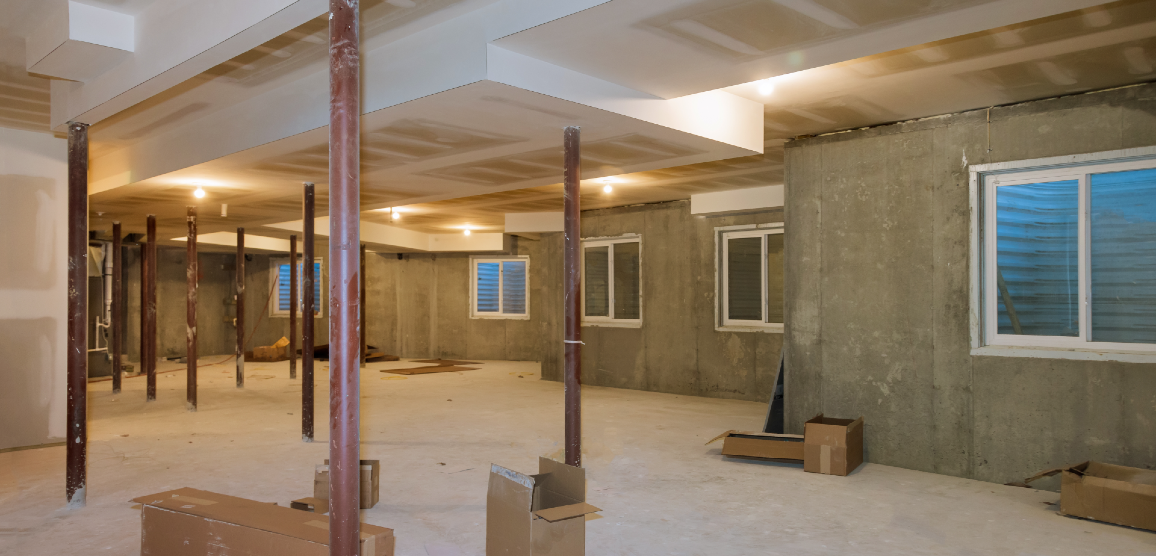Best DIY Basement Flooring Options + Best Practices

Best DIY Basement Flooring Options + Best Practices
Transforming your basement into a functional and aesthetically pleasing space doesn't have to break the bank. One of the key elements to consider is the flooring, which plays a crucial role in the overall look and feel of the room.
In this article, we will explore budget-friendly and creative DIY basement flooring options, from ideal materials to installation tips, to help you revamp your space without compromising on style or functionality.
Choosing the Ideal Material for Basement Floors
Most homeowners are working with existing concrete floors in their basement. Keep in mind that all of these basement flooring ideas will require you to prep your concrete floor.
Vinyl Flooring: Budget-Friendly
Vinyl flooring is an excellent DIY option for basements. It comes in a variety of styles, mimicking the look of tile, stone, or solid wood flooring. Vinyl is easy to install and clean, making it a practical choice for busy households. With its water-resistant properties, vinyl is well-suited for basements where moisture may be present. Consider peel-and-stick vinyl basement floor tiles for a hassle-free installation process.
Laminate Flooring: Wood-Look on a Budget
If you love the warmth and elegance of wood but are on a budget, laminate flooring is a great alternative. With its high-quality prints and textures, laminate can convincingly replicate the look of engineered wood flooring. It's relatively easy to install, and many options come with a moisture-resistant core, making it suitable for basement applications.
Cork Flooring: Eco-Friendly
Cork flooring is an eco-friendly option that provides warmth and comfort underfoot. It has natural insulating properties and is resistant to mold and mildew. Cork is also known for its sound-absorbing qualities, making it an excellent choice for basement spaces that may benefit from noise reduction.
Carpet Tiles: Customizable
For a softer and more customizable flooring option, consider carpet tiles for new basement flooring. They are easy to install, and if one section gets damaged, you can simply replace the individual tile rather than the entire carpet. Carpet tiles come in various colors and patterns, making it a unique and personalized basement flooring option.
Rubber Flooring: The Ultimate DIY Solution
When considering DIY basement flooring, the versatility and resilience of rubber flooring make it a standout choice for homeowners seeking a balance between functionality and aesthetics. Here's a closer look at why rubber flooring reigns supreme:
Unmatched Durability
Rubber flooring is renowned for its exceptional durability, making it a long-lasting solution for high-traffic areas like basements. Resistant to wear and tear, it can withstand the rigors of daily use without showing signs of deterioration. This durability ensures that your basement floor not only looks great initially but continues to do so for years to come, even in the face of heavy foot traffic or potential impacts.
Easy Installation for DIY Enthusiasts
One of the key advantages of rubber flooring for DIY projects is its user-friendly installation process. Available in various forms, including interlocking rubber tiles and rolls, rubber flooring often requires no adhesives or specialized tools. This simplicity in installation not only saves time but also empowers homeowners to embark on their basement renovation confidently, with minimal need for professional assistance.
Comfortable and Safe Surface
Beyond its durability, a rubber tile floor provides a comfortable and safe surface. Its natural resilience offers a softer feel underfoot, making it an excellent choice for areas where comfort is a priority. This is particularly beneficial in basement spaces used for recreational activities or as an additional living area, creating a cozy atmosphere for adults, children, and pets.
Moisture Resistance for Basement Environments
Basements are notorious for moisture-related challenges, even with a concrete surface. Rubber stands as a stalwart defense against the damp. Its inherent resistance to moisture makes it an ideal choice for basements where dampness, humidity, or potential water leaks might be issues. This moisture resistance not only protects the flooring itself but also safeguards against the development of mold and mildew, contributing to a healthier indoor environment.
Superior Insulation and Noise Reduction
Rubber flooring goes beyond the basics by offering excellent insulation properties. This added insulation helps maintain a more consistent temperature in your basement, contributing to energy efficiency. Even with high foot traffic, rubber's sound-absorbing qualities make it an excellent choice. Whether used in a home gym, play area, or entertainment space, rubber flooring helps create a quieter and more comfortable environment for everyone in the household.
Best Practices for DIY Basement Flooring Installation
Embarking on a DIY basement flooring project requires some planning and attention to detail. Use the following best practices to ensure a solid installation process:
Thorough Subfloor Preparation
Before laying down any flooring material, dedicating time to preparing the subfloor is crucial. Start by removing any existing flooring and thoroughly clean the surface to eliminate dust, debris, and imperfections. Ensure the subfloor is completely dry and level, addressing any irregularities or dips. A flat and dry foundation not only promotes a smooth installation process but also significantly enhances the overall longevity and performance of the chosen flooring material.
- Patch and Level: Fill in any cracks, gaps, or low spots in the subfloor using a suitable patching compound. This ensures an even surface, preventing uneven wear and tear on the flooring over time. You may even want to try a concrete stain for extra sealant.
- Moisture Testing: Perform a moisture test on the subfloor to identify any potential issues. High levels of moisture can adversely affect certain flooring materials, leading to warping or mold growth. Address any moisture concerns before proceeding with the installation.
Investment in Quality Underlayment
The underlayment plays a pivotal role in the overall performance and comfort of your basement flooring. Consider your specific requirements, such as noise reduction and insulation, when selecting an underlayment. Keep in mind that the nature of recycled rubber means you may not need complex underlayment.
- Sound-Reducing Underlayment: If your basement serves as a living space or home theater, investing in a sound-reducing underlayment can significantly improve the acoustics, creating a quieter and more enjoyable environment.
- Thermal Insulation: Choose an underlayment with thermal insulation properties to help regulate the temperature in your basement. This is especially beneficial in colder climates, where maintaining a comfortable and consistent temperature is essential.
Adherence to Manufacturer Guidelines
Regardless of the flooring material you choose, always adhere to the specific installation guidelines provided by the manufacturer. Following these guidelines meticulously ensures that you not only achieve a professional-looking finish but also maximize the durability and performance of your flooring.
- Acclimation Period: Many flooring materials require an acclimation period to adjust to the environmental conditions of your basement. Allow the flooring to acclimate to the space for the recommended duration before installation.
- Proper Installation Techniques: Familiarize yourself with the recommended installation techniques for your chosen flooring material. This includes proper adhesive application, seam sealing, and any other specific requirements outlined by the manufacturer.
RubberFlooring4U: Best Basement Flooring Materials
Incorporating these comprehensive best practices into your DIY basement flooring project allows you to set the stage for a successful and enduring transformation. Take the time to prepare for installation and only source the best materials for your basement floor. RubberFlooring4U is the top provider of superior rubber flooring options. Discover our premier tiles, mats, rolls, and more.
